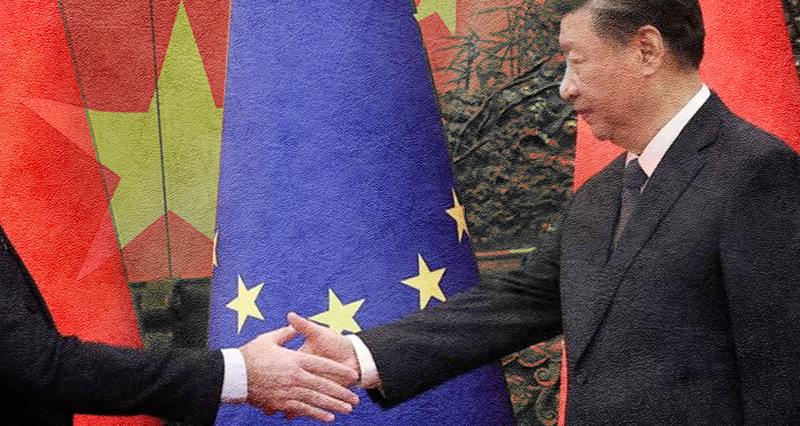EU-China Cooperation Matters Now More Than Ever
EU-China Cooperation Matters Now More Than Ever
By Mehmet Enes Beşer
As the European Union seeks leadership in a broken and more uncertain world, the nature of its engagement with China is becoming a key test case—not merely of its geopolitical maturity but of its strategic endurance in the long term. In an increasingly bloc politics-, systemic competition-, and technology-diverging international world, the EU and China must grapple with a simple question: Can they cooperate and compete at the same time? They can.
The answer, though difficult, is urgent. Future global economic stability, climate action, and rules-based order will all hang in the balance in considerable measure by how these two actors manage their growing complex relationship. As two of the world’s biggest economic actors, whether or not they can be productive, or not, will set the multipolar world that is being made.
From Mutual Suspicion to Strategic Pragmatism
There is no denying that EU-China relations are tense. Brussels’ new de-risking strategy, growing nervousness about supply chain vulnerability, and divergence on human rights and digital sovereignty have contributed to a narrative of “strategic rivalry.” Meanwhile, Beijing has grown increasingly wary of what it perceives as rising Western coordination against it, especially in the wake of the EU’s shift towards Washington on tech controls and transatlantic security cooperation.
But these tensions should not be allowed to guide the whole relationship. The EU-China economic interdependence goes too deep, and the global problems that face them—climate change, global debt distress, pandemics, and declining multilateralism—are too pressing for the relationship to be driven by clash alone.
Europe needs to be able to withstand formulating its China policy from the singular viewpoint of transatlanticism. Second-hand calculations will not prove a sustainable strategy in the long run when it involves representing EU interests. Instead, there needs to be a well-balanced, fact-based approach—protecting Europe’s values while being able to pursue tangible cooperation on matters of global concern.
Reciprocity, Not Decoupling
Most of Europe’s discomfort with China is founded upon the sense of asymmetry—especially at the point of entry into markets, regulatory openness, and investment rules. European companies, particularly in pharmaceuticals, car manufacturing, and technology, continue to face barriers in Chinese markets, years of talks apart.
This is understandable frustration. Real partnership demands a level playing field. China, having taken steps to open up sectors such as finance and EVs, must now speed up reforms that increase legal predictability, enforce IP rights, and provide greater space for foreign competition.
However, the solution to such imbalances is not through economic disconnection. The EU should not embark on the path of replicating decoupling with American tones. Instead, it should support balanced openness from organized dialogue, open-ended interventions, and interdependent channels for accountability. Institutional trust rehabilitation has nothing to do with ideology.
Climate Cooperation as Strategic Imperative
If there is one field where EU-China cooperation is not just desirable but essential, it is climate change. Both have grand plans—Europe with the Green Deal, China with its twin carbon goals (peak by 2030, carbon neutrality by 2060). But achieving these goals will require more than the deployment of domestic effort; it will require deep technological collaboration, collective financing, and an equitable transition strategy for developing nations.
Co-investment in green hydrogen, carbon markets, battery recycling, and energy efficiency standards could not only propel global climate objectives but also generate thousands of jobs on both continents. A formal EU-China Climate Compact, grounded in current frameworks but with measurable commitments, could be the flagship of a new partnership.
Toward a Rules-Based, Not Rules-Controlled, Multilateralism
One of the most significant causes of tension within EU-China relations is differing perceptions regarding global governance. Europe emphasizes legal norms and institutional legitimacy, while China prefers state sovereignty and flexibility. These are real differences, yet they are not insurmountable.
Instead of letting disputes about governance erode cooperation, both sides need to work together on reforming multilateral institutions. The World Trade Organization, International Monetary Fund, and the United Nations cry out for a revamp. China and the EU can together set an example for transforming dispute resolution systems, making decision-making more democratic, and modernizing world rules to suit the digital and green economy.
By doing so, they can offer a solution to minilateralism and exclusionary “coalitions of the willing,” the new global governance trend. Global governance must serve the Global South’s interests, and an EU-China joint effort can ensure that inclusivity is a guiding principle, not an afterthought.
Conclusion: A Partnership Worth Rescuing
The EU-China relationship is complex, multifaceted, and at times strained. But it must exist. Competition is unavoidable, but confrontation is not. The task is to establish a relationship that can support both strategic autonomy and strategic interdependence—a relationship that welcomes competition in trade but cooperation in climate, health, and development.
This has nothing to do with naive optimism. It has everything to do with strategic realism. Europe and China cannot navigate the uncertainties of this century alone. But by practicing symmetrical cooperation with respect, collectively they can help stabilize a disordered world and build an architecture of cooperation befitting the era of multipolarity.
It is now time to move away from competition towards resilience. If the EU and China do so, they will not only secure their own fate but also help chart a more sustainable and inclusive course for the world.

















Leave a Reply